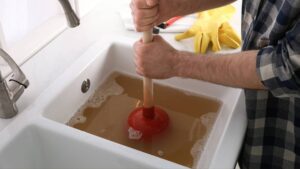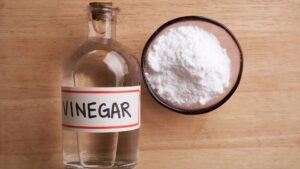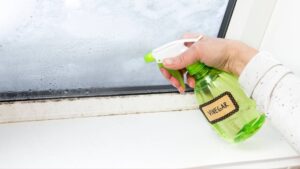Vinegar & Baking Soda DIY Tricks
Maintaining clean and free-flowing drains is crucial for the overall health of your plumbing system. While there are various commercial products available, a simple yet effective solution lies right in your kitchen: baking soda and vinegar.
In this guide, we’ll explore the benefits of using this common household duo to clean drains, providing an eco-friendly and budget-conscious alternative. By incorporating this straightforward method, you can keep your drains clear of debris and prevent potential clogs, all while promoting the longevity of your plumbing!
Clogged & Smelly Drains: Reasons Why This Happens
Dealing with clogged drains isn’t just inconvenient; it can also lead to unpleasant odors that permeate your home, creating an uncomfortable atmosphere. Whether it’s the stench rising from kitchen sinks or foul smells emanating from bathroom drains, the embarrassment of guests noticing can be overwhelming.
Let’s address the reasons behind clogged and smelly drains in order to not only maintain a pleasant living environment but also for preventing potential health hazards and costly repairs down the line.
- Hair and Soap Scum: In bathroom drains, hair and soap scum are common culprits for blockages and foul smells.
- Mineral Deposits: Hard water can leave mineral deposits inside pipes, narrowing the passage for water flow and trapping debris.
- Food Waste: Food particles and grease buildup can accumulate over time, leading to clogs and unpleasant odors.
- Foreign Objects: Accidentally dropping small items like jewelry or toiletries down the drain can obstruct the pipes.
- Poor Ventilation: Inadequate ventilation in plumbing systems can lead to stagnant water, promoting bacterial growth and emitting foul odors.
- Sewer Line Issues: Problems in the main sewer line, such as tree root intrusion or blockages, can cause backups and foul smells throughout the house.
Addressing these issues promptly with proper cleaning and maintenance can help prevent clogs and keep drains smelling fresh. But, can baking soda and vinegar really help you out in times of clogged and smelly drains?
Baking Soda & Vinegar: Miracle or Myth?
Vinegar is often hailed as a miracle solution, touted for its ability to clean windows, remove stains from clothes, and even aid in digestion when consumed. Martha Stewart enthusiasts may be familiar with the myriad of ways vinegar can be used, boasting around 26 different hacks for everyday tasks. But can vinegar really work its magic when it comes to clearing a clogged drain?
The truth is that the combination of vinegar, baking soda, and hot water can effectively help unclog drains and eliminate unpleasant odors in both the bathroom and kitchen. Here’s how it works:
- Vinegar and Baking Soda Reaction: When vinegar, which is acidic, comes into contact with baking soda, which is alkaline, a chemical reaction occurs. This reaction produces carbon dioxide gas, which creates fizzing and bubbling action. This bubbling action helps dislodge and break down debris, grease, and other materials that may be causing the clog in the drain pipes.
- Mechanical Action: As the mixture bubbles and fizzes, it also generates pressure within the drain pipes. This pressure can help push through the clog or loosen it from the sides of the pipes, allowing it to flow more freely down the drain.
- Hot Water: Hot water helps to further dissolve and wash away the loosened debris. The heat helps to melt grease and other substances, making them easier to flush out of the pipes. Additionally, hot water can help sanitize and eliminate any lingering bacteria or odor-causing particles in the drain.
- Deodorizing Properties: Vinegar is known for its deodorizing properties. As it reacts with the baking soda and hot water, it helps neutralize foul odors that may be emanating from the drain. This leaves behind a fresher and more pleasant scent in the bathroom or kitchen.
By combining these three ingredients and utilizing their chemical and mechanical properties, you can effectively tackle clogs and odors in your drains without resorting to harsh chemical cleaners. It’s a safe, eco-friendly, and cost-effective method for maintaining clean and free-flowing drains in your home.
Will Vinegar & Baking Soda Work Everytime?
While vinegar and baking soda can work wonders for minor clogs and routine maintenance, they may not always be sufficient for more severe drain blockages. Here are three signs that indicate it’s time to call a professional plumber rather than attempting to unclog the drain yourself:
- Persistent Clogs
If you’ve tried using vinegar, baking soda, and hot water multiple times but the drain remains clogged or only partially clears, it’s a sign of a more stubborn blockage. Persistent clogs may indicate a deeper issue within the plumbing system, such as tree root intrusion, mineral buildup, or a damaged pipe. In such cases, a professional plumber can assess the situation and provide targeted solutions to address the root cause of the problem.
- Foul Odors or Sewage Backup
Strong, unpleasant odors emanating from the drains or sewage backup in sinks, toilets, or tubs are indicators of a serious plumbing issue that requires immediate attention. These symptoms may suggest a sewer line blockage, pipe damage, or a malfunctioning septic system.
Attempting DIY solutions in such scenarios can exacerbate the problem and lead to costly repairs. A licensed plumber has the expertise and equipment to diagnose and resolve complex sewer and drainage issues safely and effectively.
- Multiple Clogged Fixtures
If multiple fixtures in your home, such as sinks, toilets, and showers, are experiencing simultaneous drainage problems, it’s likely a sign of a more extensive plumbing issue. This could indicate a blockage or malfunction within the main sewer line that serves your property.
Addressing mainline blockages requires specialized equipment and expertise that only a professional plumber can provide. Attempting DIY repairs in such situations can result in further damage and disruption to your plumbing system.
DIY or Professional Plumbers?
In summary, while DIY methods like vinegar and baking soda can be effective for minor drain maintenance, they may not always suffice for more serious plumbing issues. Knowing when to call a professional plumber is essential for preventing further damage, ensuring the safety of your home, and restoring proper functionality to your plumbing system.
If you encounter persistent clogs, foul odors, sewage backup, or multiple clogged fixtures, don’t hesitate to contact a qualified plumber for expert assistance.




